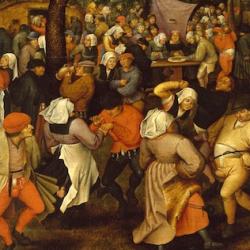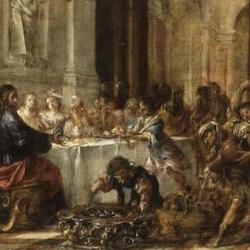John 15 (ESV)
1 “I am the true vine, and my Father is the vinedresser. Every branch in me that does not bear fruit he takes away, and every branch that does bear fruit he prunes, that it may bear more fruit. 3 Already you are clean because of the word that I have spoken to you. 4 Abide in me, and I in you. As the branch cannot bear fruit by itself, unless it abides in the vine, neither can you, unless you abide in me. 5 I am the vine; you are the branches. Whoever abides in me and I in him, he it is that bears much fruit, for apart from me you can do nothing. 6 If anyone does not abide in me he is thrown away like a branch and withers; and the branches are gathered, thrown into the fire, and burned. 7 If you abide in me, and my words abide in you, ask whatever you wish, and it will be done for you. 8 By this my Father is glorified, that you bear much fruit and so prove to be my disciples. 9 As the Father has loved me, so have I loved you. Abide in my love. 10 If you keep my commandments, you will abide in my love, just as I have kept my Father’s commandments and abide in his love. 11 These things I have spoken to you, that my joy may be in you, and that your joy may be full.”
Let us pray.
Father in heaven, brighten our hearts and minds by the Spirit of Jesus, so that His living words might abide in us, and we in Him, that we may bear much fruit. Amen.
The analogy Jesus draws between the vine and branches on the one hand, and Himself and His disciples on the other, only works because the order of creation anticipates the contours of redemption. The analogy works only because it is literally true that a vine is in the branches and the branches are in the vine. And that principle applies to the whole creation. We find the same curved and curling shape everywhere we look. Everywhere, things circle back to enclose what encloses them.
We are in the air and the air is in us. We are surrounded by plants and animals yet we live only if those plants and animals enter us. Song comes out from lungs and lips, but then the song envelops the singer. The lilac scents our environment, yet it enters us too. There is a continuous exchange between inside and out across the porous boundary of our skin and through the doorways of our senses. Tree in branch and branch in tree, man in woman and woman in man, everything woven in a web of mutual abiding, everything a home for every other thing, all entwined as one knotted world, one flesh.
In a word, the world is a marriage, and that is true because everything is created by and in the image of a God who is an eternal conjugal communion: The Father in the Son and the Son in the Father, the Spirit in the Son and the Son in the Spirit, Father, Son, and Spirit always already arrived at the consummation of their infinite love and life. What we are doing today chimes and rhymes with the deepest structures of the universe. This wedding, like every wedding, gives a glimpse of the sub-sub-atomic realities invisible to the microscope, a gaze into galaxies beyond the reach of every telescope. Here God whispers mysteries in our ears; here He treats us as friends not slaves and shows us the deep things of the world, which are the deep things of God.
For these reasons, a meditation on marriage is always a meditation on the nature of God and His creation, and a meditation on marriage is also always a meditation on the way of life that goes with the grain of the universe. But how? How can you keep your marriage in sync with the cosmic marriage? Let me make several brief observations.
First, remember what it means to be free. Our world twists marriage out of all recognition. Radical feminists tell us that marriage is legalized rape or slavery. Gay activists want to redefine marriage to include same-sex unions. Behind these and all other assaults on marriage is the view that true freedom is unfettered self-direction. We are truly free only if we can escape the constraints that others impose on us and do whatever we please. We are truly free only when we cast off even the constraints of creation itself, when we mold and remold male and female according to our whims. As a natural corollary, we’ve been catechized for centuries in Pelagianism, the vain promise that, being free, we have the resources to live well within ourselves.
Autonomy is a lie, the most original of lies. Freedom, whether in marriage or the rest of life, does not consist in shaking off commitment and constraint but in fulfilling those commitments. And we do not have in ourselves what we need to live well. Marriage, like all of life, depends on listening. I am not talking about “listening skills” that counselors emphasize, but about something more fundamental. Unless God’s word breaks in and breaks down our delusions and rationalizations, we are lost. Your marriage will thrive, your marriage will be free, only insofar as you are attuned to another , to God’s call to love.
Second, love your neighbor. God always speaks in specific circumstances and He always calls us to love specific neighbors with specific, physical needs. Nowhere is this more true than in marriage. Courtly lovers might pursue lovers of the mind, but real marriages unite two bodies as one flesh. In a few moments you will promise to spend your life meeting the very concrete, very bodily needs of a very needy neighbor who will be closer than any other. You are not vowing faithfulness to the ideal of marriage. You are vowing to keep faith with one another, each of you called to lay down your life for one other person.
Third, you are not in control. God’s call is specific, but it is, paradoxically, also open-ended. Have you taken a close look at your vows? Has your attorney? If he had, he would certainly urge you to be more cautious, to hedge your bets and include some loopholes. You’re going to promise to love and cherish one another in sickness and health, for better for worse, for richer or poorer. You’ll promise to forsake all others and cling to each other. What sickness might disrupt your lives? How poor might you be? What exactly does “worse” mean? What if someone more attractive comes along? Do you have any idea what you’re promising? Of course you don’t. How could you? You’re committing yourself to a lifelong adventure, a life of exploration and surprise. You are called to experiment with ever fresh ways to love and care for one another. All of which means, you are called to a life of faith.
Fourth, you will fail. You are called to love one another in concrete but utterly open-ended ways, and you won’t be able to do it, not perfectly. Sloth, envy, lust, anger, and all rest will make their appearance and need to be mortified. Your marriage will be the great revelation that you do not know how to love; if you don’t know it already, your marriage will teach you soon enough that you do not know how to be reconciled. Your marriage will be a deep revelation that you cannot sustain any relationship without the Spirit of reconciliation. Your marriage will reveal that you cannot live out the nuptial life in Christ except as a continuously given gift, which you must receive by faith.
Fifth and finally, keep in step with the Spirit. Today, we stand between Pentecost and Trinity Sunday. That sequence of the church year points to a profound truth, because it’s the Spirit of Pentecost who leads us to Trinity, the Spirit who breathes us into fel
lowship with the Father and Son, the Spirit who brings Jesus to live in us and we in Jesus, the Spirit who unites vine to branches and branches to vine. And it is a perfect setting for a wedding, because it’s the Spirit who unites man in woman and woman in man: By the Spirit, you are one flesh; and by the Spirit, you will remain so. Not just your wedding day, but your entire life together stands between Pentecost and Trinity. Trust in and rely on the Spirit of Jesus, and your marriage will shine more and more with the glory of the nuptial communion that is the Triune God.
In the Name of the Father, and of the Son, and of the Holy Spirit. Amen.
Let us pray.
Heavenly Father, You sent Your Son to deliver us from sin and death, and in the last days poured out that Spirit to unite Your people to Jesus as branches in the vine. Fill, we pray, these your servants with that Spirit of love, that they might be so joined together that they might display in their marriage the eternal nuptial communion that You have with Your Son in the Spirit. Through Jesus Christ our Lord. Amen.
(Note: Much of this homily was inspired by several rich pages on marriage in Brian Brock’s Christian Ethics in a Technological Age.)











